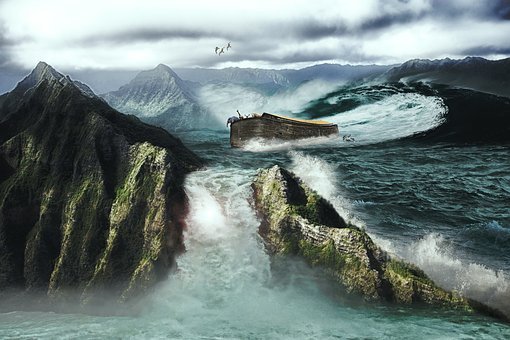And as it came to pass in the days of Noah, even so shall it be also in the days of the Son of man. They ate, they drank, they married, they were given in marriage, until the day that Noah entered the ark, and the flood came, and destroyed them all. Luke 17:26, 27
What will the days be like prior to the return of Christ? How will men conduct themselves at that time? Jesus gives an answer to these questions by referring to two periods of time recorded in Biblical history. The first reference is to the time before the flood.
Before the great flood in the days of Noah the people lived to a very old age. Scripture cites several examples of people who lived more than nine hundred years. We know that if a person is not touched by the redeeming grace of God he will grow in sin. Sin never stands still What beasts in sin those people must have been who lived hundreds of years and spent all those years in Satan’s employ!
Yet, when Jesus characterizes the life of the people of Noah’s day, he mentions only the seemingly innocent things. They ate and drank, they married and were given in marriage. They ate and drank, they feasted, as though there weren’t a cloud in the sky. They looked toward the future and laid plans for the future by marrying and giving in marriage. Even though the “preacher of righteousness” (II Peter 2:5) warned them that judgment was about to fall and there would be no future, they lived the same way they had always done. They simply paid no attention. Let that man Noah talk! (or rave?) Let him build a ship on dry land! This world won’t be destroyed! Let us eat and drink and be merry…
The days before the second coming of Christ will be the same. People will continue to live the way they have always done in spite of all divine warnings and predictions. They will think only of the present and make such plans for the future as are necessary to insure physical comfort. No thought is given to the possibility that this world will not always stand. As the people of Noah’s day either ignored or ridiculed his warnings, so the world will either ignore or ridicule the warnings of the church of Christ.
So will it be in those days. How far do those days lie in the future? To ask the question is to answer it. We are living in those days! Modern man says: “Don’t upset me with such dire predictions.” When our leaders warn us of the awesome destruction which would come in nuclear warfare, modern man trembles a moment, shrugs it off, and goes on as before.
In this passage our Lord does not speak of the grievous sins which will be committed in the last days; rather he pictures a totally heedless and careless world! Though the people are warned verbally, though the signs are unmistakably clear, they simply stop their e.·us and close their eyes. They will not be warned!
The deluge came as a complete surprise because the people of that day had failed to give heed to previous warnings. Before the rains began God closed the door of the ark behind Noah and his family. How it rained! Forty days and nights! Fear began to grow. Finally even the tops of the mountains were covered. How small that group of people who were safe in the ark! The warnings were not baseless. Destruction came.
The heedlessness of the people in Noah’s days will be duplicated in the last days of this world’s history. The surprise at the end will be far greater. Then it will not be a process of forty days to complete the destruction. Christ’s return will be as sudden as a flash of lightning. The destruction itself will be just as complete. Only those in the ark (in the Christ) will be safe.

Questions
1. How can we combat heedlessness among church members?
2. Do you think some people may have repented during the forty days that the rain fell?
3. What are some indications of heedlessness today? Why don’t people give heed to clear warnings of Scripture? Do we sound the warning note enough?
